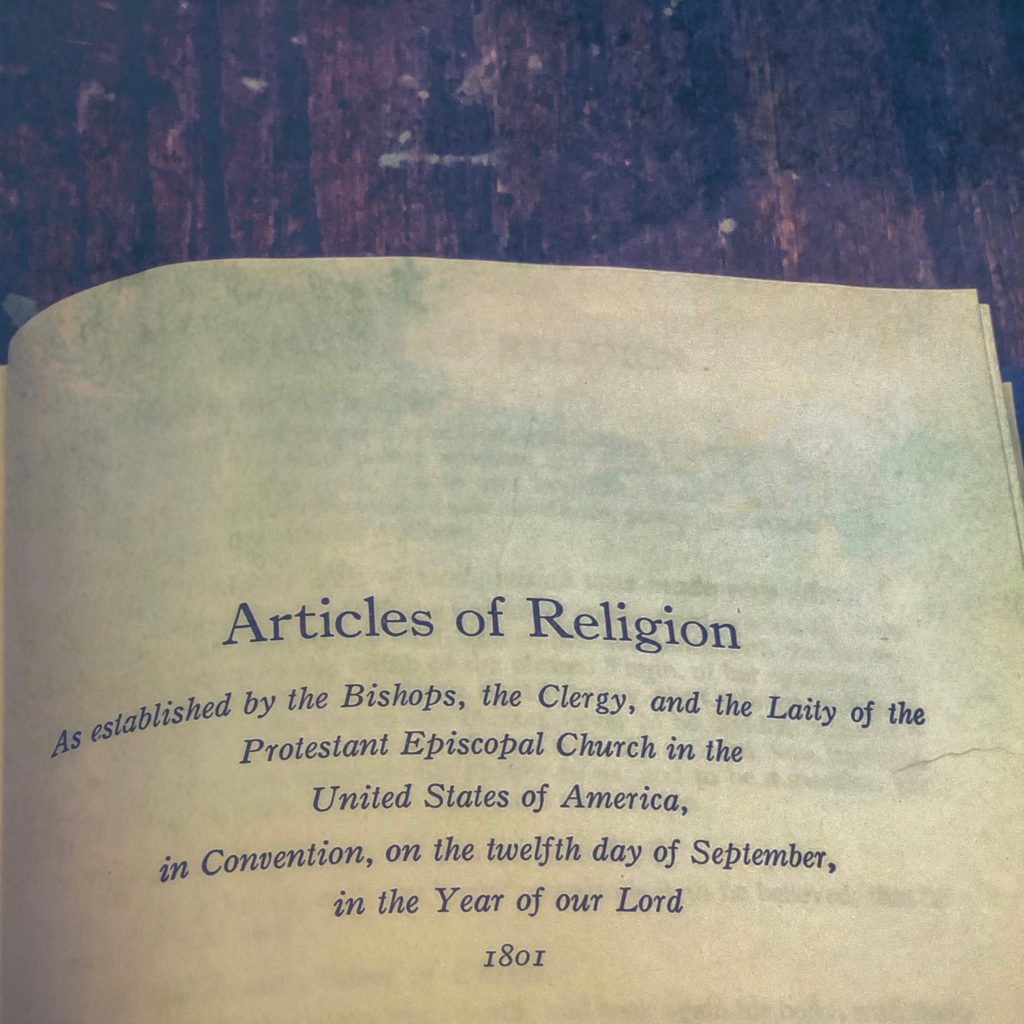
Predestination to Life is the everlasting purpose of God, whereby (before the foundations of the world were laid) he hath constantly decreed by his counsel secret to us, to deliver from curse and damnation those whom he hath chosen in Christ out of mankind, and to bring them by Christ to everlasting salvation, as vessels made to honour. Wherefore, they which be endued with so excellent a benefit of God, be called according to God’s purpose by his Spirit working in due season: they through Grace obey the calling: they be justified freely: they be made sons of God by adoption: they be made like the image of his only-begotten Son Jesus Christ: they walk religiously in good works, and at length, by God’s mercy, they attain to everlasting felicity.
As the godly consideration of Predestination, and our Election in Christ, is full of sweet, pleasant, and unspeakable comfort to godly persons, and such as feel in themselves the working of the Spirit of Christ, mortifying the works of the flesh, and their earthly members, and drawing up their mind to high and heavenly things, as well because it doth greatly establish and confirm their faith of eternal Salvation to be enjoyed through Christ, as because it doth fervently kindle their love towards God: So, for curious and carnal persons, lacking the Spirit of Christ, to have continually before their eyes the sentence of God’s Predestination, is a most dangerous downfall, whereby the Devil doth thrust them either into desperation, or into wretchlessness of most unclean living, no less perilous than desperation.
Furthermore, we must receive God’s promises in such wise, as they be generally set forth to us in Holy Scripture: and, in our doings, that Will of God is to be followed, which we have expressly declared unto us in the word of God.
by the Rev. Canon Dr. Kara N. Slade
1. Fear and Trembling
Article XVII, by far the longest of the 39 Articles, is long for a reason. All theology should be carried out in a spirit of fear and trembling, but this maxim applies in a special way to theologizing around the doctrines of election and predestination. Here, care is called for as well as humility. Here we reach a tremulous hand towards the eternal decrees of God before the beginning of time. Here, we ask a terrible question before the throne of a sovereign God. How, and in what sense, are humans chosen to receive salvation? How, and in what way, do we participate in our salvation, if at all?
As I write these words about God’s loving justice, I am aware that I above all stand under that judgment first. I do not, and indeed cannot, stand outside it as a detached theological observer. The question of anyone’s salvation is the question of my salvation. And so it goes for you too, my dear reader. This is not an intellectual exercise.
What are the doctrines of predestination and election? In the simplest terms, election for Christians means that God chooses to be God for us in Christ. It is a notion that goes back to the calling of Israel to be God’s people, to the covenant with Abraham in Genesis 17:7, “I will establish my covenant between me and you, and your offspring after you throughout their generations, for an everlasting covenant, to be God to you and to your offspring after you.” Again and again in Scripture, we see that God chooses to be in relationship with humans in their particularity. Historically, however, election can also mean that God chooses some people for salvation but not others.
The doctrine of predestination is associated with this latter understanding of election. There are several flavors of this doctrine that have been considered over the centuries, and a careful examination of each flavor is far beyond the scope of this post. However, the major categories can be generalized like this:
- Arminian view: God predestines people based on his foreknowledge of who would exercise their free will to hear and accept the Gospel.
- Calvinist view: From eternity, God decrees who will receive salvation, entirely without regard to their actions.
- Lutheran and Thomist view: God decrees who will receive salvation, but reprobation is a product of human sin.
Why is this doctrine important? Why delve into matters that are at best an unapproachable mystery and at worst run the risk of painting a caricature of an arbitrary God? There are two reasons.
- First, the doctrine of predestination and election is a question of the doctrine of God. It deals with how God’s nature as all-knowing and God’s sovereignty interact with human free will.
- Second, it is a question of the all-sufficiency of grace for salvation. Simply put, a strong doctrine of predestination and election means that it isn’t up to us to contribute to our own salvation. Rather, it is sheer gift. It is all grace. And it cannot be lost. This is a comfort to all those who, like me, worry on our worst days that we have to try harder in order to be in right relationship with God.
These doctrines should be good news. But the history of how they have been used is often ugly. They have been the site of separation between us and them, between saved and damned, between human and less-than-human. They have been used not for spiritual self-examination and consolation, but for comparison with others, scrutinizing their behavior and fortune to ferret out the fruits of election or the deserved consequences of reprobation.
When overlaid with ideas of Western culture as salvific, it can result in other parts of the world – and particularly Africa – being marked as the site of reprobation, unelection, and damnation. And so, as we consider this Article and its implications, we must do so with deep and abiding caution against any acts of comparison.
2. Sweet, Pleasant, and Unspeakable Comfort
Looking at the text of the article itself, we find that one of its most striking features is its pastoral emphasis. This is not an article that travels in the realm of the abstract. Instead, it takes into account the fact that thoughts of one’s eternal destiny have a profound impact on our hearts and our lives, on what my pastoral theology colleagues might call our affect and behavior. When we meditate on God’s freely given and unmerited gift of salvation, it should be a “sweet, pleasant, and unspeakable comfort” that works to “establish and confirm” our “faith of eternal Salvation to be enjoyed through Christ” and “fervently kindle” our “love towards God.” It is good news, indeed the best news, that God has chosen to be for us in Christ outside any accounting of our own things done and left undone. Our salvation is not a matter of divine bookkeeping, of balancing out credits and debits through our own efforts. Thanks be to God.
But the Article doesn’t stop there. It is also quite clear that we are not to look for the marks of reprobation in others, or to preach God’s judgment of the reprobate. We are not to drive others into despair. The end of the Article leaves much unsaid, and perhaps quite strategically. Many commentators argue that it can be read as supporting so-called single predestination, or predestination of the elect only. But I believe it can also be read as endorsing double predestination, even while admonishing those within the Church to exercise prudence in how that doctrine is taught or proclaimed for the sake of “curious and carnal persons.” Whenever we talk about God’s “no” to humanity, we are enjoined do so with our neighbors’ faces always before us.
3. Predestination as Good News
Reformed theologians describe predestination as one of the doctrines of grace. It tells us that God has never been God except that God has chosen to be God for us, and to be in relationship with us. What’s more, it reminds us that grace is a gift: free, unmerited, and beyond all measure. Grace overflows us, surrounds us, and sweeps us up in God’s embrace so that in Christ we are made heirs of the promise. At the heart of this Article, and of this doctrine, is the great consolation that Paul speaks of in Romans 8:28-39:
We know that all things work together for good for those who love God, who are called according to his purpose. For those whom he foreknew he also predestined to be conformed to the image of his Son, in order that he might be the firstborn within a large family. And those whom he predestined he also called; and those whom he called he also justified; and those whom he justified he also glorified.
What then are we to say about these things? If God is for us, who is against us? He who did not withhold his own Son, but gave him up for all of us, will he not with him also give us everything else? Who will bring any charge against God’s elect? It is God who justifies. Who is to condemn? It is Christ Jesus, who died, yes, who was raised, who is at the right hand of God, who indeed intercedes for us. Who will separate us from the love of Christ? Will hardship, or distress, or persecution, or famine, or nakedness, or peril, or sword? As it is written,
‘For your sake we are being killed all day long; we are accounted as sheep to be slaughtered.’
No, in all these things we are more than conquerors through him who loved us. For I am convinced that neither death, nor life, nor angels, nor rulers, nor things present, nor things to come, nor powers, nor height, nor depth, nor anything else in all creation, will be able to separate us from the love of God in Christ Jesus our Lord. (Romans 8:28-39, NRSV)
God’s love for us is so complete, so all-embracing, that he will and does go all the way tous, forus and for our salvation. Not part of the way. Not halfway. All the way.
But what are we to say about the matter of election to reprobation? What are we to say about the sentence of God’s No that echoes with God’s Yes? For me, and for my theological beloved Karl Barth, the difficulty with predestination comes when we attribute it to specific individuals, or to groups of people. I am elect, and you are not. My nation is elect, and yours is not.
What if predestination was truly not a matter of comparison, of distinguishing between me and you, between us and them? What if we took the words “in Christ” in this Article seriously?
As Barth writes in his commentary on Romans, and again in the Church Dogmatics, there is only one object of election: Jesus Christ. On Christ, and on Christ alone, falls both God’s election and God’s reprobation. As the electing God and elected man, Christ bears what fallen humanity cannot. In him and through him, we hear God’s resounding Yes to each one of us as the first and last word. In that is our hope, our comfort, and our salvation.
The Rev. Canon Dr. Kara N. Slade is Associate Rector of Trinity Church in Princeton, NJ and Associate Chaplain to the Episcopal Church at Princeton University. She also serves as Canon Theologian of the Diocese of New Jersey. Canon Slade holds the PhD in mechanical engineering and materials science as well as the PhD in theology and ethics, both from Duke University. Her research interests include Karl Barth, Søren Kierkegaard, epistemology, and the ethics of medicine and war, and her first book, The Fullness of Time, is forthcoming from Cascade Books.
